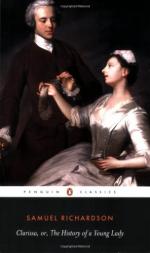LETTER III
Mr. Lovelace, to John Belford,
ESQ.
Sunday morning.
I have had the honour of my charmer’s company for two complete hours. We met before six in Mrs. Moore’s garden. A walk on the Heath refused me.
The sedateness of her aspect and her kind compliance in this meeting gave me hopes. And all that either the Captain and I had urged yesterday to obtain a full and free pardon, that re-urged I; and I told her, besides, that Captain Tomlinson was gone down with hopes to prevail upon her uncle Harlowe to come up in person, in order to present to me the greatest blessing that man ever received.
But the utmost I could obtain was, that she would take no resolution in my favour till she received Miss Howe’s next letter.
I will not repeat the arguments I used; but I will give thee the substance of what she said in answer to them.
She had considered of every thing, she told me. My whole conduct was before her. The house I carried her to must be a vile house. The people early showed what they were capable of, in the earnest attempt made to fasten Miss Partington upon her; as she doubted not, with my approbation. [Surely, thought I, she has not received a duplicate of Miss Howe’s letter of detection!] They heard her cries. My insult was undoubtedly premeditated. By my whole recollected behaviour to her, previous to it, it must be so. I had the vilest of views, no question. And my treatment of her put it out of all doubt.
Soul over all, Belford! She seems sensible of liberties that my passion made me insensible of having taken, or she could not so deeply resent.
She besought me to give over all thoughts of her. Sometimes, she said, she thought herself cruelly treated by her nearest and dearest relations; at such times, a spirit of repining and even of resentment took place; and the reconciliation, at other times so desirable, was not then so much the favourite wish of her heart, as was the scheme she had formerly planned—of taking her good Norton for her directress and guide, and living upon her own estate in the manner her grandfather had intended she should live.
This scheme she doubted not that her cousin Morden, who was one of her trustees for that estate, would enable her, (and that, as she hoped, without litigation,) to pursue. And if he can, and does, what, Sir, let me ask you, said she, have I seen in your conduct, that should make me prefer to it an union of interest, where there is such a disunion in minds?
So thou seest, Jack, there is reason, as well as resentment, in the preference she makes against me!—Thou seest, that she presumes to think that she can be happy without me; and that she must be unhappy with me!
I had besought her, in the conclusion of my re-urged arguments, to write to Miss Howe before Miss Howe’s answer could come, in order to lay before her the present state of things; and if she would pay a deference to her judgment, to let her have an opportunity to give it, on the full knowledge of the case—




